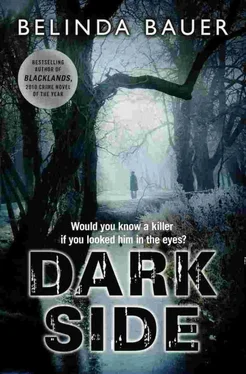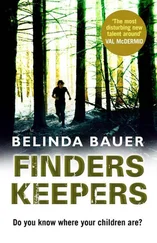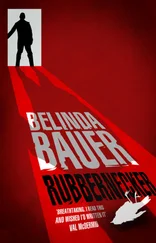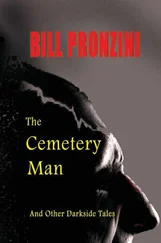Now he surfed through the channels for what felt like the hundredth time. It didn’t take long. BBC1, BBC2 and ITV1, though BBC2 was grainy and flickering. Channel 4 and Five were seemingly beyond the reach of this part of the moor. He imagined the second test match from Australia dancing and crackling somewhere above his head, searching forlornly for a receiver high enough to be welcomed by, before finally weakening and sputtering out over the heather, lost to him for ever.
Fucking Timbuktu.
He looked at his watch. Ten thirty pm.
The night was young.
Unfortunately, so were his team. They were like babies, the way they were all in bed by ten. Not like his days in the Met, where they’d roll off duty when they ran out of arms to twist and spend the rest of the night in Spearmint Rhino. DS Reynolds was a reasonable cop but Marvel couldn’t imagine his sergeant stuffing a twenty into a G-string any more than he could imagine him doing a shampoo ad. DS Reynolds’s hair grew on his head in unfortunate tufts. Sometimes they almost joined up; other times he was nearly bald. Reynolds claimed it was stress-related. Fucking nancy boy.
Marvel ran a hand through his own hair and wondered how long it would be before he was shedding like a Persian cat. His hair would go first, then his teeth. Then his joints, he imagined. Or maybe his eyesight. Already he needed to squint at the menu at McDonald’s drive-thru. Once he’d tried to order a McFury, imagining it must be some hellishly well-peppered new burger. He and the pimpled girl in the window had almost come to blows before she worked it out and told him with some degree of triumph that a McFlurry was a kiddies’ ice-cream. He’d ordered it just to spite her, and lobbed it vaguely towards a bin as he drove out.
Just imagining his teeth falling out made them twinge, so he stopped thinking about dying and concentrated on Margaret Priddy. He’d spoken to the nurse, Annette Rogers, and was reasonably satisfied she was in the clear. She seemed to be going through the motions of sympathy in a way he’d expect a professional nurse to – as if she was simultaneously wondering what she would have for tea. That was fine by Marvel; if she’d wept and wailed over Margaret Priddy’s death, he would have had her in custody before her ugly white shoes could touch the ground.
There were two other nurses who had split shifts with Annette Rogers. He had asked Reynolds to track them down for interview.
He pulled the flimsy file towards him and checked. Lynne Twitchett and Gary Liss. A male nurse. Marvel would have snorted if there’d been anyone in the room to hear him pass comment on male nurses. In his head he knew Gary Liss was large, soft, blond – and camp as a row of tents. He’d lay good money on it.
He lost focus on the TV while he thought of how the investigation would proceed, all the elements that he needed to ensure worked together. When it came to leading a homicide investigation, Marvel liked to think of himself as a swan, sailing majestically along while under the surface his team paddled like crazy to keep the whole thing moving smoothly in the right direction.
Marvel mused on Margaret Priddy. It was a strange one. He had been working murders since he was twenty-four years old and his instincts were pretty sharp, but they didn’t have to be honed to know that it’s hard for a mute and bedridden old woman to make enemies.
But he also knew that friends could be just as dangerous.
In the morning he’d speak to Margaret Priddy’s son.
* * *
After smothering Margaret Priddy, the killer had gone home, showered, and made himself a cheese and bacon sandwich. There was an old black-and-white film on TV – a wide-eyed Hayley Mills lying her earnest way out of trouble over the sound of his teeth on salty meat and sticky bread. He didn’t like to turn the volume up. He watched the girl clambering over rocks, spying on a church picnic, jumping on the back of a white pony. The killer switched off the TV and threw away what was left of his sandwich. He curled into a foetal ball on the couch, slept like a baby, and when he awoke he felt like a new man.
The first snow of this winter came in blustery little flurries, like handfuls of frost thrown across the moor by a petulant god. It gathered on the ground only in pockets and made the moor look merely wan rather than truly white. In the villages it made the pavements slippery without making them pretty first, and for that sin the hardy residents of Exmoor – ponies and people alike – hunched their shoulders and doggedly ignored the stinging flakes.
Despite getting off on the wrong foot, Jonas called Marvel before leaving the house, to offer his local knowledge to the investigating team. It was only professional.
There was a brief pause on the other end of the crackly line, then Marvel said, ‘I think we’ll manage without you—’ before the line went dead. He might have been cut off – mobile signals were notoriously poor on Exmoor – but Jonas was pretty convinced he’d just been hung up on.
He put the phone back in its cradle and Lucy looked at him curiously.
‘Business as usual then,’ he shrugged, feeling like a fool.
By 9am the snow had stopped and by ten it had started to melt away.
Jonas had a routine. Park at the edge of each village he covered and walk up one side of the main street and back in a rough loop. He would pop into tiny shops or post offices, check on old folk, referee neighbour disputes, have a Coke in the pub. Only when he was sure all was well would he move on to the next village. It let the locals see what their taxes were buying in the way of policing. In winter each village took half the time it did in summer. Summer meant stopping to chat, giving directions to tourists, enjoying the sunshine, buying an ice cream. Winter was all brisk pace and hurried hellos so people could get back to their work or their hearths.
But the Exmoor grapevine had been active and today everybody wanted to talk about Margaret Priddy. Doors opened as he passed and warmth wafted from cottage doors as women stood on doorsteps and asked about what had happened, while passers-by hurried over to hear the latest.
There was no latest, of course. Not that he knew about anyway – and by early afternoon Jonas was sick of saying ‘I don’t know,’ and seeing the surprised, embarrassed looks on the faces of the locals.
In Exford he asked old Reg Yardley to walk his dog by the river and not on the green – for only about the hundredth time – and the man strode off muttering something about catching real criminals. Jonas let it go, but it didn’t help his guilt or his rising sense of frustration that he was at the frontline of public relations but without any inside knowledge of the investigation to make him seem anything more than a barrier between the people and the information. Not that he could or would have told people much more than he was able to now, but being able to say ‘we’ instead of ‘they’ when talking about the murder hunt would have reassured people that their local bobby was taking an interest, and made him feel like less of a fraud. Jonas was not a self-important man – when Lucy had been diagnosed with Multiple Sclerosis he had left his future behind him and never looked back – but for the first time in his career he felt he needed the validation of being an insider. It made him abashed to admit it, even to himself.
Finally back in Shipcott, he walked past the flapping blue-and-white tape cordoning off Margaret Priddy’s cottage at the end of the row. The Taunton cops had put it up to keep people out, but, of course, all it had done was draw attention to the scene. Since Sunday morning when it went up, he’d seen local boys daring each other under the tape to knock on the door, and now he noticed that Will Bishop had left milk on the doorstep. It had frozen in one of the bottles and pushed the silver-foil lid up into the air, where it perched like a jaunty cap on a misshapen column of crystalline calcium.
Читать дальше












